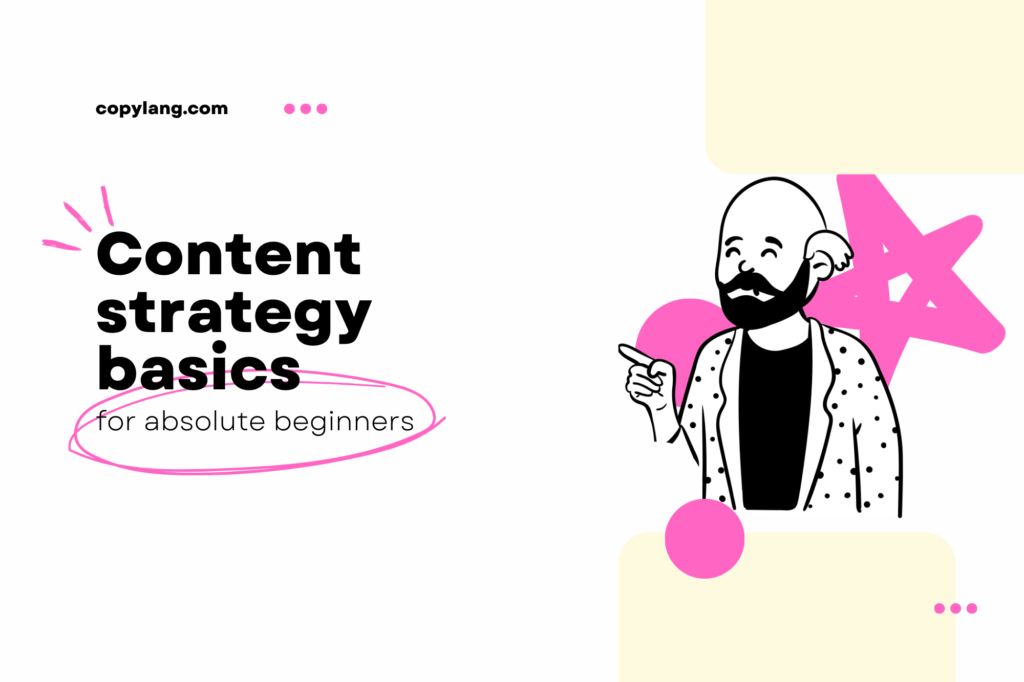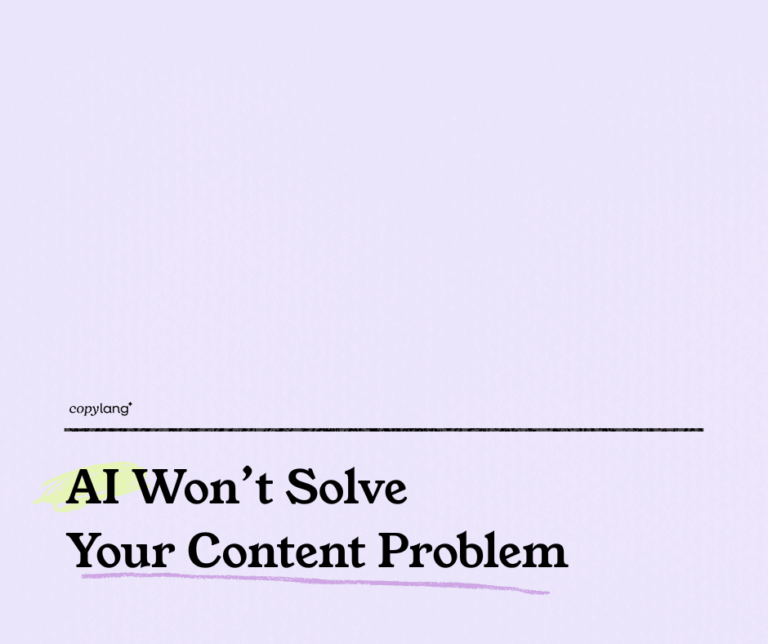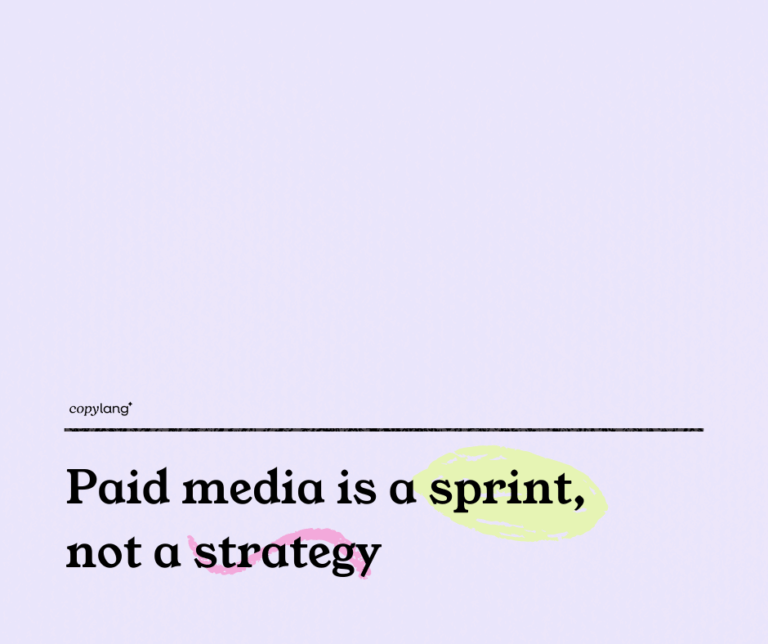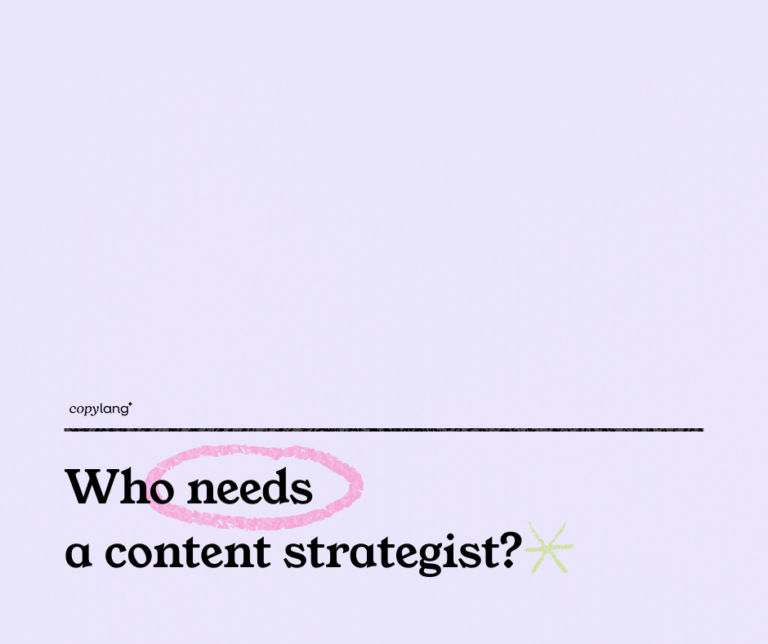Contrary to popular belief, you don’t need a degree in writing to become a content writer.
Here’s a good example: CEOs and agency owners trust me with their content and copy needs — and I’m technically a nurse. 🤷
Some of the best writers that I know didn’t go to school for writing, either. Most of them are former teachers, chefs, engineers, or even career-shifters who didn’t finish college.
So what’s the deal?
Instead of a degree, these folks became indispensable content marketers by possessing the following skills:
1. An understanding of why businesses need content
To begin a career in content marketing, you first need to understand why businesses need content in the first place.
Why do brands post memes on social media? Why do they spend money on long-form blog posts? Why do they need video scripts, email copy, and all that good stuff?
It’s not just because they’re bored and wanna hang around all day on social. 😂
They publish content because every modern business needs it to:
- Reach new customers
- Build brand awareness
- Nurture their existing leads —
- — and finally, persuade them to buy
Content is a crucial part of every buying journey — not a nice-to-have.
Once you understand the role content plays in the greater scheme of things, you can better align your services to your client’s bottomline. This, in turn, helps you find people who share the same values and avoid penny projects and dreadful content mills.
Start your content career on the right foot by knowing its purpose and value.
2. Written and spoken English that goes beyond grammar
Next, you need to speak well and write well.
Here’s the problem with non-native English writers, particularly Filipinos: we’re taught to write in a very formal way. We’re told to use big complicated words to signal our intellect. The harder the word is to pronounce, the smarter you are.
And so now, after 3+ years of reviewing resumes, I always come across chunky cover letters that beat around the bush or sample articles that are full of big, flowery language.
Grammatically, they’re correct. But they fail to meet one fundamental goal: to write to be understood.
If you want to succeed as a content writer, you need to learn how to write in a clear, concise, and natural way.
Instead of writing like you’re taking IELTS (sorry, friends!), try doing these instead:
- Remove adverbs and passive voice from your writing.
- Use tools like Hemingway to check for clarity.
- Learn how to write conversationally by observing dialogue. Watch English-language talk shows, listen to podcasts, and read books.
- Engage in Slack groups, Twitter, and LinkedIn to gain confidence.
3. Topic research skills

Newsflash: Googling things is a skill.
As a writer, you’ll encounter a lot of unfamiliar topics. If you’re working remotely or asynchronously, you’ll likely have to deal with these things on your own. That’s why you need some sharp research skills in your arsenal.
Cute example: I once built a survival brand’s blog from zero to 15k unique visitors per month, even when I lacked survival skills myself.
What we did
Research played a crucial role in creating content that people trusted. Our research process involved:
- watching hours of video
- scouring expert forums like Reddit
- Hanging out at survival communities
- Reading comments on popular blog posts
- Rigorous fact-checking
- Chasing the original sources of stats
- Interviewing and collaborating with subject matter experts
To create content that packs a punch, work on your research skills. Tap on your curiosity and use the tools at your disposal to learn more about a certain topic. Then, use that info to create valuable content.
4.Knowing your audience

Aside from topic research, another indispensable skill is audience research.
Content marketing is often a game of resonance. And to create content that truly resonates, you need to know who you’re writing for in the first place.
Who are you trying to reach? What kind of value are you providing them?
How to know your audience
One way to know your audience is through demographics. These are details like your audience’s location, age, sex, and background. Once you have that down pat, take it a step further by learning more about the following:
- Their pain points – What problems are you helping them solve?
- Their goals – What goals are you helping them achieve?
- Search intent – Why are they searching for the topic you’re writing about?
- Their tone – How do they speak? How should your content sound?
These details are called psychographics, AKA the secret sauce to create content that truly resonates. Psychographics will help you determine your content’s tone, angle, format, and platform. Knowing how to use this will help you become an indispensable member of any team.
5. Keeping things simple
The secret to clear writing? Being able to explain things like you’re talking to a five-year-old.
This is especially useful if your content goal is to educate audiences. In those cases, you’re the audience’s advocate. You’ll need to understand how things work and then relay it to your readers in a way that they can easily understand.
Developing this skill is easier said than done. Just like how maestros make things look easy, the ability to write clearly comes with lots of practice.
Here’s what you can do to develop this skill:
- Ask an editor or beta reader to help you polish your writing
- Using media like graphics and videos to explain things
- Breaking complicated stuff down using analogies and metaphors
Related: How my nursing degree taught me to be a better writer
6. Versatility
Most gurus will tell you to find a niche as soon as possible, but I’ll tell you the opposite:
When you’re starting out as a content writer, try as many mediums and formats of online writing as you possibly can. Cast your net wide and be open to different experiences. This will help you figure out your strengths, your interests, and natural inclinations.
The worst that could happen is you’ll take a longer route off discovering your niche; the best is you’ll gain a lot of transferable and marketable skills.
Trying different writing formats or styles will also help you develop versatility.
You’ll learn how to:
- Adjust your tone depending on the niche and brand voice
- Work with different niches
- Write different forms of copy (e.g., long-form blogs, emails, landing pages, etc.)
Versatility will come in handy especially when you work with lean teams or different clients. Make sure to develop it!
7. Ability to follow editorial briefs

As an editor/strategist, I appreciate writers who can follow editorial briefs and guidelines.
Editorial briefs are documents that contain instructions on what the piece should look like. It usually contains:
- The topic of the article
- Goal of the piece and intended audience
- The subtopics that you need to cover
- SEO keywords
- Deadline
Sometimes, editors and content managers will also give you submission guidelines. These are more general than briefs and outline the following:
- General submission dos and don’ts
- Formatting guidelines
- Brand voice guidelines
Content leaders will expect a certain level and type of output from you. If you can follow these briefs and show that you are a reliable team member, you’ll gain trust and get lots of work your way.
8. Taking feedback well
Another important skill is being able to receive constructive feedback. As a writer, this is something that you’ll be receiving often, so it’s important to develop thick skin.
Remember: your editor or content lead is not trying to attack you; they’re giving feedback to help you improve your work. Come from a place of objectivity and use their feedback to become better at your craft.
Take it to the next level
Create a list of your editor’s most common revision notes. Do you see a pattern or recurring comments? These are the skills that you need to improve.
For example, if your editor keeps on asking you to “tighten your intros”, work extra hard to make sure that your next submissions have strong, punchy openings. Better yet, ask them for specific tips on *how* to improve your intros. Good writers appreciate feedback, but the best ones proactively ask for them.
9. Basic technical skills
You also need to equip yourself with key technical skills like basic analytics, SEO, and content management. A content writer doesn’t just “write”. They also need to complement their writing skills with the following:
- Analytics – this is how you measure the effectiveness of your content marketing efforts. You need to at least be familiar with metrics like impressions, engagements, and reach.
- Search Engine Optimization (SEO) – SEO makes a huge chunk of modern content marketing. In a nutshell, SEO is about optimizing written posts (e.g. articles, blog posts, etc.) so that the search engine can find them better. Learn more about it here.
- Content Management Systems (CMS) – You need to know how content management systems like WordPress, Squarespace, and Webflow work. You’ll be using these platforms to upload written content and other media.
10. Leveraging AI

Lastly, you need to learn how to maximize AI.
Like it or not, AI tools like ChatGPT are now part of modern content marketing life. Instead of fearing these tools, use them to your advantage. Leverage AI’s capabilities to make you even better at your job.
Use it to:
- Check for grammatical errors
- Rephrase copy
- Create templates and outlines
- Brainstorm ideas quickly
- Do small, repetitive tasks to free up more time for creative work
- Summarize long text and transcripts
Related: How to prevent ChatGPT from taking your job
To recap
Here are the 10 basic skills that’ll give you an edge as a content writer/marketer in 2024
- An understanding of why businesses need content
- Impeccable written and spoken English
- Topic research skills
- Knowing your audiences
- Keeping things simple
- Versatility
- Being able to follow editorial briefs
- Taking feedback well
- Basic technical skills like SEO, content management, and analytics
- Leveraging AI
Don’t get me wrong — you can definitely learn these skills in school. If you’ve got a degree in writing, communications, or marketing, good for you! Lots of amazing opportunities await. 🤩
But if you’re shifting careers, starting from scratch, or scared to take the leap — you’ve got the same opportunities in front of you as well.
Wait, what if I don’t have these skills yet?
Don’t worry, you don’t have to check everything on the list just yet. In my case, I probably had 5 of these skills when I first got hired for my full-time content role. The rest, I learned on the job.
The point of this post was to help you set a baseline. Which of these skills do you currently have and which ones do you need to work on?
What’s next
If you’re starting from absolute scratch, start developing these skills today. Here’s what you can do:
- Take free courses on content writing
- Join communities
- Take action by taking side-hustles and collaborating with other writers
- Learn on the job
I hope this post helped you gain clarity on the skills you need to possess to begin a career in content marketing. Remember: the internet levels the playing field for everyone. Learn these basic skills, and you’ll be living your dream sooner than you think. 😉
Best of luck!







